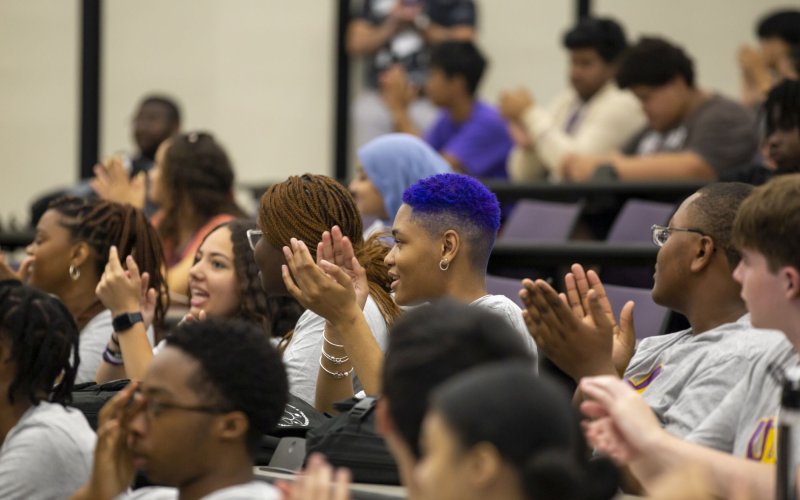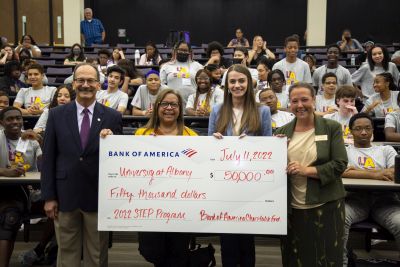Bank of America Support Helps Summer STEM Program Grow

ALBANY, N.Y. (July 14, 2022) — More than 100 Albany area middle and high school students gathered in a lecture center hall Monday morning, the start of a summer introduction to technology and the sciences, research and University life.
The Science & Technology Entry Program (STEP) Summer Institute at UAlbany, a partnership between University at Albany, the New York State Education Department, the City of Albany LIGHT Program and the Albany City School District, is designed to expose students who are economically disadvantaged or are underrepresented in STEM fields to college programs that lead to careers in the sciences and health care spaces, and technical and licensed professions.
STEP is primarily funded by the State Education Department with generous support from the Bank of America Charitable Foundation, which has been supporting the program for four consecutive years. This year the bank donated $50,000 to the summer program, which covered the cost of 14 students, said STEP Director Mayra Santiago.

UAlbany STEP also is a worksite through the Albany’s Summer Youth Employment Program, and students over the age of 14 can earn a salary for participating in research through STEP.
“Bank of America supports the Mayor’s Summer Youth Program as part of our ongoing commitment to creating pathways for success and advancing workforce development opportunities for our youth,” said David Cornell, president, Bank of America, Albany/Hudson Valley. “Investing in our youth, through programs like STEP prepares our city and state for a better tomorrow. We applaud STEP for its dedication to supporting underrepresented students and we look forward to building a brighter, more equitable future together.”
The Bank of America grant goes specifically to the College Overview and Research Experience (CORE) program. CORE offers high-achieving high school juniors and seniors a credit-bearing course, mentoring in laboratory settings, and library research and SAT prep instruction. This year there are 37 CORE students.
Monday morning’s program began with an enthusiastic welcome from Joshua Overrocker, STEP’s associate project director. Students were also addressed by Santiago as well as President Havidán Rodríguez and Vice Provost and Dean of Undergraduate Education JoAnne Malatesta, who said she is looking forward to the research presentations at the end of the program. “I cannot wait to see all the great work you will do as you work to change the world.”
One research project focuses on the pollution that disproportionately affects economically disadvantaged neighborhoods. Brian Frank of the Department of Environmental Conservation (DEC) is leading a group of students in a field research project — measuring and mapping air pollution levels in Albany’s South End. DEC has been involved with STEP and CORE for six years, part of the agency’s commitment to environmental justice, said Frank, who is chief of the DEC’s Emissions Measurement & Research Group.
Ryan Ma, a psychology major at UAlbany who will be a senior this fall, is teaching a different kind of course: a research focused psychology class. Ma said he initially applied to STEP be a student assistant in the program but was asked to teach based on the strength of his research background.
Santiago noted that the success of STEP is a result of collaboration and support from NYSED, the Albany City School District, Bank of America, and the University Administration. “Our STEP CORE summer program is successful because of our collaborations and commitment to the youth we serve in the Capital Region,” she said. “The past success of our STEP CORE graduates has resulted in countless benefits for our current student participants. The precedence of excellence set by prior scholars is a model for our younger STEP students.”




